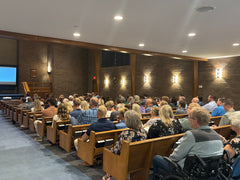Your cart is empty now.

Reformed Education
This is an extract from chapter 4 of Reformed Education, by David J. Engelsma, pages 61-63.
_______________
It is fitting that we treat the heart of the subject of Reformed Christian education in connection with the teacher. Although it is a slight exaggeration to say that the school is its teachers (for God has blessed and used schools that suffered for a time with poor teachers), the thrust of the exaggeration is correct: Christian education is Christian teachers teaching covenant children.
After the building is up, the principles printed, and the teacher training completed, Christian education begins—the mystery of teaching. It is a mystery. It is more than a good lesson plan. It is more than a brilliant scholar before children. It is a gift. A good Christian teacher and good Christian instruction are great gifts of the Holy Spirit. There was good reason why the original 21st Article of the Church Order of Dordt called for good schoolmasters: “The consistories shall everywhere see to it that there are good schoolmasters . . . ”
It is an integral part of the covenantal conception of the school to view the teacher as standing in the place of the parents. The day school is a demand of the covenant, an aspect of the parents’ calling in the covenant. Therefore, the school is an extension of the home, a parental school, and the teacher’s status is that he stands in the parents’ place, or office.
This defines the authority of the teacher with regard to the students: it is nothing less than the authority of the parent, nothing less than God’s authority given to parents, nothing less than the authority referred to in the fifth commandment: “Honour thy father and thy mother . . . ” (Exod. 20:12). This must be preached to the children by the pastor in sermons on the fifth commandment. It must be inculcated upon the children by the parents. It must be insisted on by the teacher himself.
For parents to connive at their children’s disrespect for any teacher, much more to foster disrespect, is for parents to assist in making rebels whom God will cut off from the land, and is for parents to cut their own throats. It is the parents’ own authority in the teacher that they are undermining. There may no more be disparagement of teachers in the presence of the children than a disparagement of each other by parents. As regards the teacher’s weaknesses and faults, parents and students alike must always keep in mind the instruction of the Heidelberg Catechism as to how God requires us to respond to the “infirmities” of those in authority: “patiently bear with their weaknesses and infirmities, since it pleases God to govern us by their hand” (Q. 104).
That the teacher stands in place of the parents is the historic Reformed conception of Christian education. Dr. H. Bouwman wrote:
“The rule ought to be, that the school originate with the parents. According to the ordinance of God, the full task of rearing rests first of all upon the parents. To the many aids which serve to assist the parents in this rearing belongs especially the school. The school takes over a part of the task of the parents. It follows from this, that the school must stand on the same foundation as the Christian family, that is to say, on the ground of the covenant...”
When Bouwman sums up what he has said about Christian schools, his first point is this: “That according to Reformed principle, the schools must originate from the parents.” As biblical basis for this position, he appeals to Deuteronomy 4:9, 10; Deuteronomy 6:7, 20; Ephesians 6:4; and Colossians 3:20, 21.[1]
[1] H. Bouwman, “Scholen,” in Gereformeerd Kerkrecht, vol. 1 (Kampen, Netherlands: J.H. Kok, 1928), 520, 521. The translation of the Dutch is mine.
_______________
The content of the article above is the sole responsibility of the article author. This article does not necessarily reflect the opinions and beliefs of the Reformed Free Publishing staff or Association, and the article author does not speak for the RFPA.

Donate
Your contributions make it possible for us to reach Christians in more markets and more lands around the world than ever before.
Select Frequency
Enter Amount










